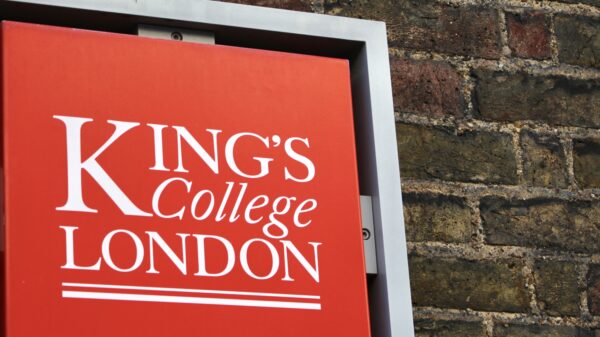King’s clinicians have helped to develop a new app to revolutionize care for out-of-hospital cardiac arrest (OOHCA) patients. Roar’s Science and Research Correspondent Jana Bazeed speaks to Dr. Nilesh Pareek about what this will mean for patients and doctors.
New Prototype app developed by @EnsonoIT and Dr Nilesh Pareek, a Consultant Interventional Cardiologist @KingsCollegeNHS aims to revolutionise #care for out-of-hospital #cardiac arrest #patients
➡️ https://t.co/osoKS8nXNV pic.twitter.com/VaaJz0lzCG
— King's College Hospital Research (@KCH_Research) January 24, 2023
Using a neurological risk score from MIRACLE2- an algorithm developed through Dr. Nilesh Pareek’s research- the app assesses a patient’s risk of brain damage after suffering an out-of-hospital cardiac arrest. The prototype app was developed over three days in a Microsoft hackathon as a collaborative effort between King’s College London, King’s College Hospital (KCH) and a team from Ensono Digital.
Roar had the opportunity to chat with Dr. Pareek about his research:
“[OOHCA], for the non-medical readership, it is when your heart stops effectively either with a bad rhythm or it completely stops, which is different to a heart attack […] what happens is that some heart attacks can cause out of hospital cardiac arrest. […] So the heart attack is so severe that your heart stops,” clarified Dr. Pareek.
“It’s a really important condition […] [There are] up to 80,000 cases per year in the United Kingdom, and the outcomes are sadly very really poor. […] only about 10% of patients survive to leaving hospital. It’s a huge need, really to improve care for that patient group.”
Dr. Pareek’s interest in the area started early in his career, tracing back to his time as a Junior Cardiologist based at King’s.
“I was always struck by the fact that we didn’t really have a feel for how patients would fare. They’d come in, you know, with a tube down their throat, often unclear circumstances for their cardiac arrest. And we would often put them through quite challenging, invasive procedures […],” he recalled.
“We’d be very proud and glad at three days when the patient survived and we would be really happy with how it went, but there were other times when it was really quite tragic outcome and the patient might die because of brain death or they’ll be left with brain injury.”
It was these experiences that inspired him to start the research that would lead to the development of the MIRACLE2 algorithm, in an attempt to predict the risks to a patient’s neurological health at the earliest stages of OOHCA: “I started to collect data as part of my PhD and I found that there was a trend of certain variables which are built within the MIRACLE2 score,” he explained.
“It was seven variables: things like whether you’re witnessed or not, whether you’ve got an acid in your blood, whether you’ve had adrenaline given.” The result of these findings was the development of the MIRACLE2 score, a predictive algorithm which helps clinicians understand a patient’s risks of brain injury very early. A low score indicates a high chance of survival, a high score a low chance of survival, therefore allowing appropriate treatment to take place.
The prototype app, developed in collaboration with Ensono Digital—the cloud consulting and managed services business unit of Ensono—was largely developed based upon the MIRACLE2 algorithm.
Thanks to the Novel Emerging Technology Grant from Heart Research UK, Dr. Pareek looks forward to seeing the MIRACLE2 score applied in the community before even reaching the hospital. “A paramedic will take a blood sample, [and] calculate the MIRACLE2 score.” Explained Dr. Pareek.
Dr. Pareek pointed out that the idea for developing the app largely came from a desire to “move forward with the times”, expressing his disappointment that medical technology has “lagged behind” commercial technology: “We know that not everyone can remember the seven variables and especially in an emergency. So, what we wanted to do was provide clinicians with an app that was really easy to use and could then give you an idea of the brain injury that a patient was facing.” He hopes that with further research, they would be able to investigate which areas would be of most use to clinicians.
Dr. Pareek is optimistic about increased digital intervention in the field of healthcare:
“I think it’s a really important trend. I call it the Deliveroo concept, right, when you order a pizza on Deliveroo, you know very well where that pizza is at all times until it reaches your front door. […] That technology exists and what we need to do is harness those technologies for healthcare.”
“Imagine a world where we had a cardiac arrest patient, let’s say in South London and we get a phone call as the on-call heart attack team, and the exact location of the cardiac arrest, the MIRACLE2 score, all of the predictive analytics [are] there. And then [in] the middle of the night, we can also track the ambulance coming in so we can prepare the teams to treat that patient.”
“If we can do it for our pizza, why can’t we do it for our patients?”
-Dr. Nilesh Pareek
With any new developments, there’s always going to be some controversy surrounding it. When it comes to increased digital intervention in healthcare, the most vocal concerns are those regarding privacy algorithmic biases.
When asked about these ethical concerns, Dr. Pareek acknowledged the severity of the issues at hand:
“I think that’s important because as our capacity for technology increases and digital innovation increases, our ability to locate patients [and] have their details, identifiable details on databases increases, and obviously the data security is obviously a major concern for that. So, there is a balance between having the right amount of data that permits you to treat the patient properly. But on the other hand, you know putting the patients details at risk and that’s something that will come with time, I think.”
“The other concept is about, you know, predictive analytics […] we need to make sure that predictive analytics don’t overfit to a certain population. In the past, certain populations have been over studied and we’re now realizing that actually the analytics can be different for, for example, ethnic groups or genders. And it’s really important that when we do predictive analytics that they don’t discriminate in a non-medical way against certain groups.”
“So, it’s our duty as clinician scientists to really push that forward. But I think if we do it well, we can really improve the care for patients at the end of the day and to understand that there are subgroups that would benefit most.”
“We’re in a position now where we need to really do the research properly and then roll the applications out in a very ethical manner.”
-Dr. Nilesh Pareek
Looking to the future, Dr. Pareek expressed excitement at the room for innovation in medical technology over the next few years:
“I think there’s going to be a lot of expansion in different areas. I think a few areas that we’re going to see quite rapid expansion in is things like automation of imaging. At the moment, you know, you come in, you have your CAT scan, a CT scan or you have your echocardiography scan that takes years of training and clinician to interpret those images. And we’re only human, you know, you think about every slice of a CT scan, and that could be missed […] I think in the future AI won’t be replacing the clinician, but it will be supporting the clinician […] I think the built-in algorithms within imaging in particular is quite exciting.”
“I think we’re always concerned that AI will replace a clinician, but I think it won’t; it will support the clinician.”
-Dr. Nilesh Pareek
At the end of our chat, Dr. Pareek highlighted the importance of learning basic first aid and CPR, as it could be difference between life and death in some cases: “What’s really important, and it’s sort of a public health message, is learning CPR, learning how to do chest compressions. Is really important because we know that that saves lives. It reduces the MIRACLE2 score, right? Because if we can all learn CPR, we’ll have better outcomes for cardiac arrest and that’s really important.”
“You never know, it might be you saving someone’s life in the future.”
The British Heart Foundation provides an online course on learning CPR in just 15 minutes. Anyone can also book a first aid course via the British Red Cross.
Dr. Nilesh Pareek can be found on Twitter and can be contacted via email.



















